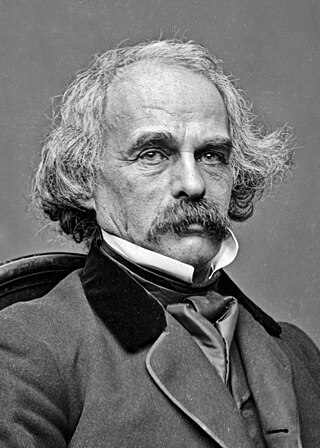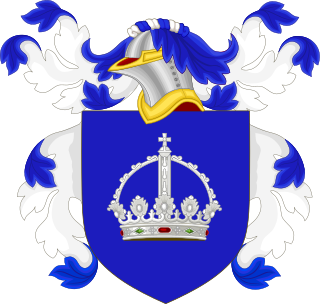Related Research Articles

Nathaniel Hawthorne was an American novelist and short story writer. His works often focus on history, morality, and religion.

Salem is a historic coastal city in Essex County, Massachusetts, located on the North Shore of Greater Boston. Continuous settlement by Europeans began in 1626 with English colonists. Salem would become one of the most significant seaports trading commodities in early American history. It is a suburb of Boston.

The Scarlet Letter: A Romance is a work of historical fiction by American author Nathaniel Hawthorne, published in 1850. Set in the Puritan Massachusetts Bay Colony during the years 1642 to 1649, the novel tells the story of Hester Prynne, who conceives a daughter with a man to whom she is not married and then struggles to create a new life of repentance and dignity. Containing a number of religious and historic allusions, the book explores themes of legalism, sin and guilt.
John Hathorne was a merchant and magistrate of the Massachusetts Bay Colony and Salem, Massachusetts. He is best known for his early and vocal role as one of the leading judges in the Salem witch trials.

John Endecott, regarded as one of the Fathers of New England, was the longest-serving governor of the Massachusetts Bay Colony, which became the Commonwealth of Massachusetts. He served a total of 16 years, including most of the last 15 years of his life. When not serving as governor, he was involved in other elected and appointed positions from 1628 to 1665 except for the single year of 1634.

The Crowninshield family is an American family that has been prominent in seafaring, political and military leadership, and the literary world. The founder of the American family emigrated from what is now Germany in the 17th century. The family is one of several known collectively as Boston Brahmins.

Greenwood Farm is a historic property and nature reserve located in Ipswich, Massachusetts, which is owned by The Trustees of Reservations. The farm is 216 acres of gardens, pastures, meadows, woodlands and salt marsh and it features the PaineHouse, a First Period farmhouse constructed in 1694.

The Peabody Museum of Salem (1915–1992), formerly the Peabody Academy of Science (1865–1915), was a museum and antiquarian society based in Salem, Massachusetts. The academy was organized in part as a successor to the East India Marine Society, which had become moribund but held a large collection of maritime materials in a museum collection at the East India Marine Hall, built in 1825 on Essex Street. The Peabody Museum was merged with the Essex Institute to form the Peabody Essex Museum in 1992. The East India Marine Hall, now embedded within the latter's modern structure, was designated a National Historic Landmark in 1965 in recognition of this heritage, which represents the nation's oldest continuously-operating museum collection.

The East India Marine Society of Salem, Massachusetts, United States, was "composed of persons who have actually navigated the seas beyond the Cape of Good Hope or Cape Horn, as masters or supercargoes of vessels belonging to Salem." It functioned as a charitable and educational organization, and maintained a library and museum. It flourished especially in the 1800s–1830s, a heyday of foreign trade.
Thomas Maule, was a prominent Quaker in colonial Salem, Massachusetts.
"A Virtuoso's Collection" is the final short story in Mosses from an Old Manse by Nathaniel Hawthorne. It was first published in Boston Miscellany of Literature and Fashion, I, 193-200. The story references a number of historical and mythical figures, items, beasts, books, etc. as part of a museum collection. Some scholars regard the real-life museum of the East India Marine Society in Salem, Massachusetts, as a model for Hawthorne's fictional museum. The narrator is led through the collection by the virtuoso himself who turns out to be the Wandering Jew.

Dudley Leavitt Pickman (1779–1846) was an American merchant who built one of the great trading firms in Salem, Massachusetts, during the seaport's ascendancy as a trading power in the late eighteenth and early nineteenth centuries. Pickman was a partner in the firm Devereux, Pickman & Silsbee and a state senator. Among the wealthiest Salem merchants of his day, Pickman used his own clipper ships to trade with the Far East in an array of goods ranging from indigo and coffee to pepper and spices, and was one of the state's earliest financiers, backing everything from cotton and woolen mills to railroads to water-generated power plants. Pickman also helped found what is today's Peabody Essex Museum.

The Essex Institute (1848–1992) in Salem, Massachusetts, was "a literary, historical and scientific society." It maintained a museum, library, historic houses; arranged educational programs; and issued numerous scholarly publications. In 1992 the institute merged with the Peabody Museum of Salem to form the Peabody Essex Museum.
Spring Pond, United States, abuts the three cities of Lynn, Peabody and Salem. In the center of these townships "is a beautiful pond". It is a secluded lake known by residents of the three cities and visitors who come to enjoy the camps, trails and natural environment of the woods. "It is in fact one of the most picturesque and romantic lakelets in Massachusetts". Stretching from Spring Pond to Marlborough Road in Salem, the pond and woods form a microcosm of beauty. On the edge of Spring Pond was once the Fay Farm, an English manor estate in New England. The mansion of Fay Farm was a well-known hotel in 1810, when the springs of these areas were believed to possess medicinal qualities. People visited the springs near Spring Pond to restore health, and worship the goddess Hygeia and drink from the rusty iron-rich water trickling from the foot of a bank. Later, some traveled there solely for fun and frolic. The hotel was then converted into a private residence. The waters of Spring Pond are conveyed by springs from an aquifer lying below Spring Pond through Peabody, Lynn and Salem. Spring Pond is listed as one of the "Massachusetts Great Ponds".
William Hathorne was a widely influential man in early New England. He arrived on the ship Arbella.
This is a timeline of the history of the city of Salem, Massachusetts, United States.
Thomas Waldron Sumner (1768–1849) was an architect and government representative in Boston, Massachusetts, in the early 19th century. He designed East India Marine Hall and the Independent Congregational Church in Salem; and the South Congregational Society church in Boston. He was also involved with the Exchange Coffee House, Boston.

The Salem Register (1800-ca.1911) was a newspaper published in Salem, Massachusetts, in the 19th century. William Carlton established it in 1800; subsequent publishers included his wife Elizabeth Carlton, John Chapman, Charles W. Palfray, Warick Palfray Jr., Haven Poole, Eben N. Walton. Among the contributing writers: William Bentley, Andrew Dunlap, Joseph E. Sprague, Joseph Story. Its office was at no.185 Essex Street.

The Hawthorne Hotel is a historic hotel located in Salem, Massachusetts on the corner of Washington Square West and Essex Street. The hotel is named after the novelist and Salem native Nathaniel Hawthorne. The hotel is currently a member of Historic Hotels of America, the official program of the National Trust for Historic Preservation. The U.S. News & World Report ranked it the number one hotel in Salem. It has also been listed as one of the top allegedly haunted places in Massachusetts.
References
- ↑ "Salem Marine Society". Salem Directory. 1842.
- ↑ Pocket Guide to Salem, Mass. Salem: H.P. Ives. 1885.
- ↑ "Hawthorne Hotel In Salem, Mass. | History |". Historic Hotels of America. Retrieved 2 January 2023.